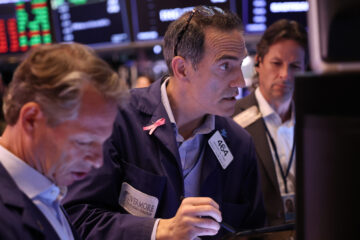Ray Kurzweil says it will happen 20 years from now.
The inventor and futurist has often said that humanity will experience the Singularlity — merging with artificial intelligence — very soon.
Related: Analyst resets Nvidia stock price target after trillion-dollar Q2
He made that claim in his 2005 book “The Singularity is Near,” and he repeated it in the follow-up book “The Singularity is Nearer.”
Kurzweil predicted nanotechnology and AI will push back against death, telling The New York Times that “by the early 2030s, we won’t die because of aging.”
AI and its promise of a spectacular future has set Wall Street on fire, becoming a major force in the stock market’s recent surge.
Sarah Poncszek, senior wealth strategy associate with UBS Private Wealth, told Fox Business on July 3 that “artificial intelligence is here to stay, and companies are making plans for the future on how to harness this.”
“As an investor you need to think about ‘how can I access this?’ because it’s very possible that AI is not only one of the largest investment beams of the next decade but potentially even our lifetime,” she said. Poncszek added that UBS’s chief investment officer estimated that AI value creation could amount to $1.6 trillion by 2027.
Jensen Huang, co-founder and chief executive of Nvidia, during the company’s GPU Technology Conference in San Jose, Calif.
Analysts respond to Nvidia’s growth
The Economist, on the other hand, has raised some doubts about the spread of AI. In a July 2 article, the magazine said that incorporating “AI into business processes remains a niche pursuit.”
“Even bullish analysts think Microsoft will make only about $10 billion from generative-AI-related sales this year,” the publication reported. “Beyond America’s West Coast, there is little sign AI is having much of an effect on anything.”
Related: Analysts reboot Nvidia stock forecasts after shares dip
The Economist pointed to the U.S. Census Bureau’s Business Trends and Outlook Survey, which found that overall use of AI tools by firms in the production of goods and services rose to 5.4% in February from 3.7% last fall, and it is expected to rise in the U.S. to 6.6% by early fall.
The use of AI by companies is still rather small because many businesses haven’t yet seen a need for it, Census Bureau researchers said.
“Many small businesses, such as barber shops, nail salons or dry cleaners, may not yet see a use for AI, but this can change with growing business applications of AI,” they said. “One potential explanation is the current lack of AI applications to a wide variety of business problems.”
However you feel about the future of artificial intelligence, we can probably all agree that Nvidia (NVDA) is the biggest name in the AI game at the moment.
Not too long ago the chipmaker briefly surpassed Microsoft (MSFT) as the world’s most valuable company, and overall, analysts have responded favorably to Nvidia’s rousing success.
Morgan Stanley analyst Joseph Moore boosted his Nvidia price target by $28 to $144 a share while affirming an overweight rating. Checks from his team following visits to China and Taiwan suggest that sales of two key products “will remain strong.”
“The catalyst path remains strong, as the very strong surge in H20 builds and demand removes any concern for us about a pre-Blackwell pause,” Moore and his team wrote.
Nvidia launched its Blackwell system of AI-powering processors this spring.
Nvidia contrarian: Firm takes ‘prudent view’
“Hopper builds continue to go up, as H100 starts to transition to H200 (bringing better memory bandwidth from HBM3e as well as higher memory content),” they added, referring to the graphics processing unit microarchitecture Nvidia developed.
Truist raised its price target on Nvidia to $140 from $128 on June 27 and affirmed a buy rating on the shares. Becoming the largest company by market cap does not appear to systematically challenge future investment returns for the stock, the investment firm said.
More AI Stocks:
Nvidia has $4 trillion value in sight as AI seen powering chip salesAdobe faces troubling FTC lawsuit for ‘trapping’ customersApple plans major change to future iPhones
Truist said that feedback from industry contacts indicates that demand for Blackwell is broadening.
And last month Wedbush analyst Dan Ives said that “over the next year, the race to $4 trillion market [capitalization] in tech will be front and center between Nvidia, Apple, and Microsoft.”
And now, the contrarian: Analysts at New Street Research New Street downgraded Nvidia to neutral from buy with a one-year price target of $135.
The firm said the shares are “getting fully valued for the base case.”
Although Nvidia remains the strongest franchise for AI data centers, New Street analysts said, “near-term expectations and valuation justify a more prudent view of the stock.”
Upside in the shares will materialize only in a bull case, in which the outlook beyond 2025 increases materially, and New Street does not have the conviction on this scenario playing out yet.
New Street said the “quality of the franchise is nevertheless intact,” and it would be buyers again of Nvidia, “but only on prolonged weakness.”
Among the artificial intelligence stocks, New Street views AMD (AMD) and Taiwan Semiconductor (TSM) as the most attractive, the firm said.
Related: Veteran fund manager sees world of pain coming for stocks


